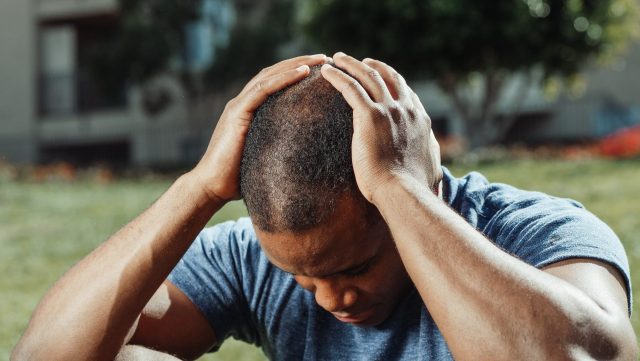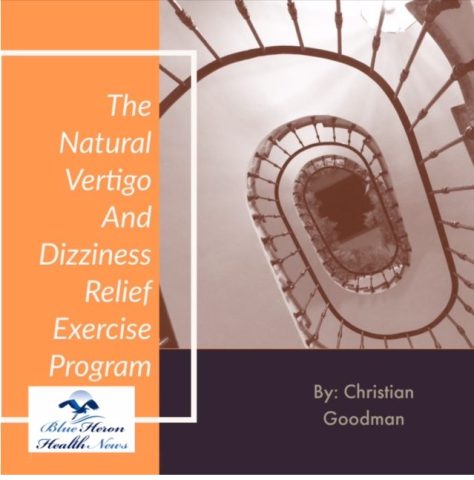How Long Does Vertigo Last? 5 Factors To Consider: Complete Guide 2024
By Vanessa Richards
January 10, 2024 • Fact checked by Dumb Little Man

Are you confused if it’s just dizziness or if you’re having vertigo attacks? Vertigo and dizziness are two terms that are often interchanged with one another. However, these phrases refer to two distinct kinds of experiences or feelings.
Vertigo and dizziness are two separate symptoms that might have a variety of origins. A common symptom of vertigo is the feeling that the world around you is spinning rapidly in circles. How long does vertigo last?
It has the potential to make you feel lightheaded and throw off your equilibrium for a certain amount of time. Vertigo isn’t an illness. Instead, it is a symptom that may be caused by several different illnesses.
How Long Does Vertigo Last: What is the Underlying Cause of Vertigo?

The main underlying cause of vertigo is the inner ear. An inner ear disorder is often the result of the following conditions:
- Benign Paroxysmal Positional Vertigo (BPPV)
- Meniere’s Disease
- Labyrinthitis or Vestibular Neuritis
Benign Paroxysmal Positional Vertigo
The condition referred to by these initials is known as Benign Paroxysmal Positional Vertigo. BPPV is caused by the accumulation of canaliths, which are very small calcium particles in the inner ear. These calcium carbonate crystals gather in the inner ear after they have been dislodged from their natural place.
Signals are sent to the brain from the inner ear, which informs it of head and body motions about gravity. It assists you in maintaining your equilibrium.
Benign Paroxysmal Positional Vertigo may happen for no apparent cause and may have anything to do with becoming older.
Meniere’s Disease
This is a condition that affects the inner ear and is considered to be brought on by a buildup of fluid and changes in pressure inside the ear. It can produce bouts of vertigo in addition to ringing in the ears (tinnitus), as well as loss of hearing.
Labyrinthitis or Vestibular Neuritis
Labyrinthitis (inner ear labyrinth) or vestibular neuritis (inflammation of the vestibular nerve) might be the problem. This is a condition with the inner ear that is often caused by infection (usually viral).
People with labyrinthitis experience ear pain, headaches, vision problems, hearing loss, and even tinnitus.
Inflammation in the inner ear, particularly around nerves that play a crucial role in the body’s ability to maintain balance, is caused by the infection. Vertigo is sometimes connected to the following conditions:
- Trauma to the head or the neck
- Problems with the brain, such as a stroke or a tumor
- Several drugs that may be harmful to the ear
- Headaches particularly migraines
Symptoms of Vertigo

Changing the posture of your head is one of the most common things that might bring on vertigo. People who suffer from vertigo often describe the condition as making them feel as if they are:
- Spinning
- Tilting
- Swaying
- Unbalanced
- Being drawn in a single direction
Vertigo is often accompanied by a variety of other symptoms, including neurological symptoms. Some of the vertigo symptoms are as follows:
- Feeling sick to one’s stomach
- Nausea
- Abnormal or jerking eye motions (nystagmus)
- Severe headache
- Sweating
- Problems with hearing or tinnitus
The duration of the vertigo symptoms might range from a few minutes to days or longer, and they may come and go.
5 Factors that Affect How Long Vertigo Lasts
The main reason behind your vertigo attack plays a significant part in determining the duration of your symptoms.
1. Meniere’s disease
Meniere’s illness may produce severe vertigo episodes that can linger for a couple of hours to days.
Vertigo is the result of this condition, which also often brings about nausea, vomiting, and loss of hearing, in addition to tinnitus.
2. Inner Ear Infection
There is a possibility that vertigo attack is brought on by inflammation.
It could be a result of an infection (viral infection or bacterial infection) in the inner ear and will continue until the infection goes away.
It is essential that you discuss different vertigo treatment options with your physician if you notice any symptoms suggesting that there may be an issue with your inner ear.
Your physician may want to ease the symptoms of vertigo. They will investigate the possibility of prescribing any drugs that are appropriate for the situation.
3. Benign Paroxysmal Positional Vertigo (BPPV)
Vertigo brought on by BPPV is one of the most prevalent reasons. The typical vertigo episodes repeat themselves but rarely last longer than one minute at a time.
4. Stroke or Damage to the Head
For certain people, vertigo is a condition that is either permanently or semi-permanently present. Vertigo may be a long-term or chronic condition for patients who have experienced a neck injury, stroke, or traumatic brain.
5. Other relevant aspects
Vertigo attacks may also be brought on by a variety of medical illnesses as well as traumas. The underlying reason for your vertigo will determine how long each episode of the condition lasts for you.
What To Do If You’re Experiencing Vertigo Attacks?
You may lower your likelihood of experiencing vertigo attacks by taking a few preventative measures. These are the following:
- Taking more time than usual to rise, turn your head, or do other actions that might be triggering.
- Sleeping with two or more pillows positioned under your head as you sleep to have your head slightly raised
- As soon as you feel faint or lightheaded, sit down immediately
- When picking something up, squatting rather than leaning over may be more effective
These simple measures may adjust your head and body movements.
How is Vertigo Diagnosed?

If you feel vertigo, contact your doctor. Your doctor may carry out a physical examination, ask you how it makes you feel, and collect your medical history. He might ask which factors trigger vertigo attacks and what makes your vertigo worse.
The physician could also do some simple tests, such as the following:
Romberg’s test
The physician instructs the patient to shut their eyes, stand with their feet together, and then place their arms by their sides. If the individual thereafter feels unstable, this may be an indication of an issue with the central nervous system.
Fukuda-Unterberger’s test
In this test, the physician instructs the patient to shut their eyes and do a spot march for thirty seconds. If they spin to one side, this might point to a problem in the labyrinth of the inner ear, which could induce peripheral vertigo. A dysfunction in the portion of the inner ear that is responsible for maintaining equilibrium is the root cause of peripheral vertigo.
It is possible that the doctor may suggest a head CT or MRI scan acquire additional information about the condition depending on the outcomes of this and other tests.
Vertigo Treatment Options
The treatment for vertigo is contingent on the underlying cause of the condition. Vertigo is a common condition that often resolves on its own without medical intervention.
This is due to the fact that your brain can adjust, even if only partially, to the changes in your inner ear, depending instead on other systems to keep your equilibrium.
Some patients need therapy, which may include the following options:
Vestibular Rehabilitation
One sort of physical treatment designed to help improve the vestibular system is called vestibular rehabilitation. It is responsible for communicating with the brain to relay information about head and body motions about gravity.
If you have attacks of vertigo regularly, vestibular rehabilitation may be prescribed for you. You may educate your other senses to assist compensate for the vertigo you experience.
Adjustments made to the location of the canalith. A sequence of very precise head and body motions is recommended for the treatment of BPPV by the guidelines of the American Academy of Neurology.
These maneuvers are performed to transfer the calcium carbonate crystals from the canal into a chamber inside the inner ear, where they may then be absorbed by the body.
As the canaliths move about in your canals throughout the treatment, you will most likely experience symptoms of vertigo. However, the symptoms of vertigo resolve thereafter.
You may find it helpful to have a medical professional or a physical therapist direct your motions. The motions are risk-free and often provide desirable results.
Medicine
Vertigo often comes hand in hand with nausea and motion sickness, all of which may be alleviated with the help of medicine in certain circumstances.
Antibiotics and steroid medication may be able to heal an infection and decrease swelling if vertigo is brought on by an infection or inflammation.
In the treatment of Meniere’s illness, diuretics, often known as water pills, are sometimes used in order to relieve pressure caused by the accumulation of fluid.
Ear Surgery
Vertigo sometimes requires medical intervention in the form of surgery. Treatment for the underlying condition that is causing vertigo, which might be something as severe as a tumor or an injury to the head or neck, could potentially help ease the symptoms of vertigo.
Professional Program For Curing Vertigo and Dizziness: Natural Vertigo And Dizziness Relief Program
This relief program offers you several exercises if you experience vertigo symptoms or are off balance. It might help with other symptoms such as head position, ear canal problems, and blurry vision as well.
It gives out comprehensive information on exercises and lifestyle practices to help combat vertigo and dizziness. This program surely is a good option to try.
Shop Vertigo and Dizziness Exercise Program at the Official Website.
Full Article: The Natural Vertigo and Dizziness Relief Exercise Program Reviews 2024
Potent Remedy For Vertigo & Dizziness: Claritox Pro

This herbal supplement helps you live a normal life even if you have balance problems. Even though Claritox contains several powerful naturally occurring components, such as alpha-lipoic acid, antioxidants, chromium, Resveratrol, and Berberine, amongst others, it is perfectly safe for healthy people to consume.
The use of Claritox Pro consistently has the potential to greatly enhance your brain health by renewing damaged brain cells. In the end, you will have a clearer mind and the absence of dizziness and vertigo will be completely gone.
Shop Claritox Pro Supplement at the Official Website.
Full Article: Claritox Pro Reviews: Does it Really Work?
When To Seek a Doctor
If your vertigo becomes severe or persistent, you should make an appointment with your primary care physician. There is a possibility that your symptoms are being brought on by an underlying health problem.
Conclusion
Vertigo may appear out of nowhere and without any warning and leaving you with a spinning feeling. Attacks of vertigo may be frightening, but they usually pass quickly and without any lasting effects.
If you are experiencing vertigo that is severe or continues for an extended period, your symptoms may be related to another medical problem.
Your healthcare professional will be able to assist you in determining the underlying cause of your vertigo and developing a treatment plan that is individualized to help you get your life back to normal. Moreover, you should try Claritox Pro supplement and practice specific head movements to prevent relapse.
Click here to Get Claritox Pro Supplement at a Discounted Price.
>>Related Article: 4 Ways How to Cure Vertigo Permanently: Complete Guide 2024
How Long Does Vertigo Last FAQs
Are there any home remedies for vertigo?
Some individuals get relief from their symptoms by using herbal supplements. Herbal treatments for vertigo include, among others:
- Turmeric
- Ginkgo biloba
- Gongjin-dan
- Cayenne
- Ginger root
Before including any herbal supplements in your diet, you should make an appointment with your primary care physician. They can guide you through the process of incorporating them into your routine in a secure manner.
How to Avoid Symptoms of Vertigo?
- Maintaining proper hydration is essential if you want to avoid dizziness and lightheadedness
- Maintain control of your stress levels
- Eat frequent meals
- Rest up
If you often have feelings of dizziness or lightheadedness, you should steer clear of certain drugs. Substances such as coffee, alcohol, and nicotine might make your symptoms worse.
If you often have episodes of dizziness, vertigo, or lightheadedness, it may be a good idea for you to use a walking stick or install rails or grab bars in your home to reduce the risk of falling.
If you suffer from vertigo regularly, you should make every effort to prevent specific kinds of movement, such as swift head motion or bending down to pick items up.
Vanessa Richards
Vanessa is a mom of 3 lovely children and a software geek. Outside of her career as a health and wellness instructor. She enjoys writing and researching on topics such as finance, software, health and culinary.



